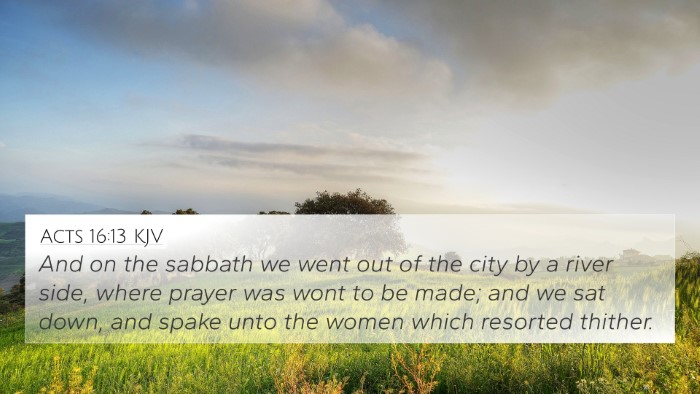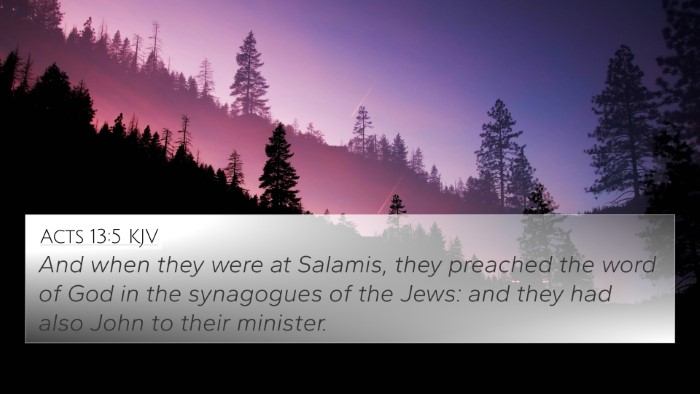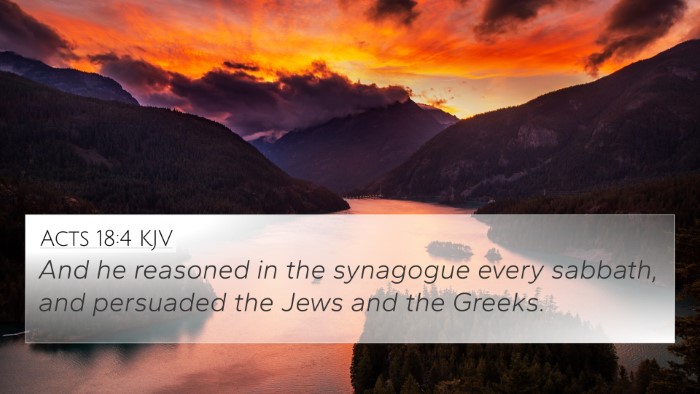Meaning of Acts 13:14
Acts 13:14 states: "But when they departed from Perga, they came to Antioch in Pisidia, and went into the synagogue on the sabbath day, and sat down."
Contextual Overview
This verse is situated within Paul's first missionary journey. After leaving Perga, Paul and his companions arrive in Antioch of Pisidia, where they enter the synagogue on the Sabbath. This action is significant as it illustrates Paul's method of evangelism, emphasizing the importance of Jewish roots in the spread of the Gospel.
Commentary Insights
- Matthew Henry:
Henry reflects on the strategic choice of synagogues for preaching, highlighting that Paul understood the culture and background of his audience, which was essential for effective ministry.
- Albert Barnes:
Barnes notes the geographical importance of Antioch and examines the implications of the movement to this city. He suggests that this journey marks a pivotal moment in the outreach to the gentiles, stemming from the Jewish practice of worship.
- Adam Clarke:
Clarke comments on the significance of the Sabbath and the inherent tradition of teaching in the synagogues. He also stresses how Paul utilized these gatherings to address the religious leaders and preach the Gospel.
Thematic Analysis
This verse embodies several key themes that are interwoven throughout scripture, including:
- Persistence in Ministry: Paul's actions exemplify his unwavering commitment to spreading the Gospel wherever he goes, despite facing challenges.
- Jewish Roots of Christianity: The choice to attend the synagogue underscores Christianity's ties to Jewish traditions and scriptures.
- Preparedness to Share the Message: The setting in the synagogue provided a platform for Paul to articulate the teachings of Jesus to an informed audience.
Bible Cross-References
Acts 13:14 can be linked to several pivotal scriptures across both the Old and New Testaments. These connections enhance our understanding of the continuity and consistency present in biblical texts:
- Acts 13:5 - "And when they were at Salamis, they preached the word of God in the synagogues of the Jews."
- Romans 1:16 - "For I am not ashamed of the gospel of Christ: for it is the power of God unto salvation to every one that believeth; to the Jew first, and also to the Greek."
- Luke 4:16 - "And he came to Nazareth, where he had been brought up: and, as his custom was, he went into the synagogue on the sabbath day, and stood up for to read."
- Isaiah 61:1 - "The Spirit of the Lord God is upon me; because the Lord hath anointed me to preach good tidings unto the meek."
- John 7:14 - "Now about the midst of the feast Jesus went up into the temple, and taught."
- Acts 17:2 - "And Paul, as his manner was, went in unto them, and three sabbath days reasoned with them out of the scriptures."
- Hebrews 4:9-10 - "There remaineth therefore a rest to the people of God."
Conclusion
Acts 13:14 serves as a vital link in the narrative of the early church, illustrating the methodical and strategic approach of Apostle Paul as he spread the message of Christ. Understanding this verse within its context and its connections to related scriptures provides a richer perspective on the foundational aspects of Christian mission.
Search and Study Tools
For those interested in diving deeper into biblical studies, several tools for Bible cross-referencing may be beneficial:
- Bible concordance
- Bible cross-reference guide
- Cross-reference Bible study methods
Utilizing these resources can enhance your understanding of connections between Bible verses and enrich your personal studies or sermon preparation.
FAQs
Here are some common questions regarding Acts 13:14:
- What verses are related to Acts 13:14? The listed cross-references above provide significant thematic parallels.
- How do Acts 13:14 and Luke 4:16 connect? Both highlight the practice of teaching in synagogues, illustrating continuity in Jesus' and Paul's ministries.












